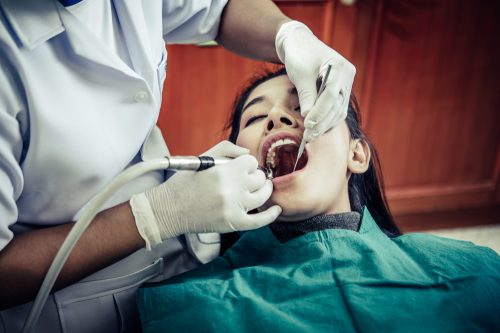Good dental hygiene is essential for a healthy smile and overall well-being. Throughout history, people have recognized the importance of caring for their teeth, leading to various methods and practices for teeth cleaning. Its interesting to explore how teeth cleaning and dental care have evolved from ancient civilizations to the present day and understand what it took for dentistry to be where it is today.
Dentistry and Teeth Cleaning in the Ancient Times

In ancient times, oral hygiene held a significant place in various cultures. People in these early civilizations valued clean teeth not only for aesthetics but also for their belief in the connection between oral health and overall health.
How did people in history take care of their teeth?
The ancient Egyptians are often credited with some of the earliest recorded practices of teeth cleaning. They used a mixture of crushed pumice stone and wine vinegar as a rudimentary toothpaste. The Greeks and Romans, too, developed their own tooth-cleaning concoctions, often using abrasive materials like crushed bones and oyster shells.
Did ancient people have clean teeth?
While these early tooth-cleaning methods may sound primitive by today’s standards, they did help maintain relatively clean teeth for some individuals. However, dental hygiene varied widely among different social classes and regions. Wealthier individuals had more resources to dedicate to oral care, while others may not have been as fortunate.
For many ancient people, clean teeth were a symbol of beauty and social status. Those with the means would often use toothpicks, twigs, or small brushes to clean their teeth manually. While these methods may not have been as effective as modern practices, they were a testament to the human desire for healthy teeth and a captivating smile.
Middle Ages and Renaissance
During the Middle Ages and the Renaissance, dental care took a different direction compared to ancient times. Due to the limited knowledge and resources available at the time, these periods were characterized by particular practices and treatments for teeth cleaning.
Meanwhile, in the Middle Ages, oral hygiene was far from advanced. Toothbrushes as we know them today did not exist, and toothpaste was a distant concept. Instead, people relied on rudimentary methods to maintain oral health.
One common method involved using sticks or twigs with frayed ends, known as “chew sticks” or “miswak,” to scrape off food particles and dental plaque. Chewing on these sticks helped in cleaning teeth and freshening breath. Additionally, some individuals would use abrasive substances like crushed eggshells, bones, or even ground-up seashells as toothpaste alternatives.
What is the old method of teeth cleaning?
Despite these efforts, dental problems were prevalent during these times. Many people suffered from tooth decay, gum disease, and tooth loss. Dental care was often a luxury reserved for the privileged, as the common population had limited access to effective methods of teeth cleaning.
The Renaissance period saw some advancements in dental care, with dentistry emerging as a distinct profession. Dental instruments, though rudimentary by modern standards, became more specialized. Barbers, who had previously performed tooth extractions, began to focus on dental procedures, and the world of dentistry slowly began to take shape.
The 18th Century
The 18th century marked a notable advancement in dental care practices, though they were still quite distinct from modern standards.
How did people clean their teeth in the 18th century?

- Toothbrushes and Tooth Powders: Toothbrushes similar to those we use today began to appear, featuring handles made of bone or wood and bristle heads made from animal hair. Additionally, tooth powders, often abrasive, were used with these early toothbrushes.
- Dental Extractions: Dental extractions were common for treating toothaches and severe dental problems. However, the process was done with rudimentary instruments and could be painful.
- Dental Fillings: Dentists started using materials like lead, gold, and amalgam to fill cavities and restore teeth. These materials, while innovative, had limitations and potential complications.
- Professionalization of Dentistry: Dentistry became more formalized in the 18th century with the establishment of dental societies and the professionalization of dentists. For example, dentists began to receive formal training. This lays the foundation for the modern dental profession.
Dental Cleaning in the 20th Century
Throughout the 20th century, dental cleaning techniques and tools evolved significantly, leading to more effective methods of maintaining oral hygiene.
The Advancement of Toothbrushes and Toothpaste

- Modern Toothbrushes: The design of the modern toothbrush continued to improve during the 20th century. Ergonomically designed handles, softer bristles, and innovative features like oscillating or sonic vibrations make toothbrushes more user-friendly and efficient at removing plaque.
- Fluoride Toothpaste: The introduction of fluoride toothpaste was a game-changer in dental care. Fluoride, added to toothpaste formulations, helps strengthen tooth enamel and prevent tooth decay. This simple yet effective addition became a cornerstone of oral hygiene.
The Role of Dental Floss and Interdental Cleaners
- Widespread Use of Dental Floss: Dental floss has become a common practice for cleaning between teeth and removing food particles. It played a crucial role in preventing gum disease and cavities in hard-to-reach areas.
- Interdental Brushes and Water Flossers: In addition to dental floss, interdental brushes and water flossers gained popularity as tools for cleaning between teeth and along the gumline. These alternatives provided more options for personalized oral care.
Professional Dental Cleanings
- Regular Dental Check-ups and Cleanings: Routine dental check-ups and professional cleanings became standard practice in the 20th century. Dental hygienists, equipped with specialized tools and knowledge, could perform thorough cleanings and remove tartar buildup.
- Ultrasonic Scaling: Ultrasonic scaling devices, introduced in the mid-20th century, revolutionized professional dental cleanings. They use high-frequency vibrations to break down and remove tartar and plaque, offering a more comfortable and efficient cleaning experience.
Oral Health Education
- Promotion of Dental Cleaning Practices: Dental professionals emphasized the importance of proper brushing and flossing techniques. Patients were educated about the correct way to clean their teeth at home, empowering them to take better care of their oral health.
Overall, the 20th century witnessed a transformation in dental cleaning practices, with the development of better tools, the incorporation of fluoride, and a greater emphasis on preventive care. As a result, these advancements continue to play a vital role in modern dental hygiene.
Experience Modern-Day Dental Care at The Avenue Dental Group
At Avenue Dental Care, your trusted and award-winning dentist in Spokane, WA, we are dedicated to providing you with exceptional dental care. Whether you need a dental cleaning, check-up, or any other dental service, we’ve got you covered.
We offer:
- Award-Winning Dentists: Our team includes top-rated dentists in Spokane, recognized for their excellence in patient care.
- State-of-the-Art Technology: We use the latest dental technologies and state-of-the-art equipment to ensure you receive the best possible care.
- Personalized & Comfortable Treatment: We offer personalized treatments tailored to your unique needs, ensuring your dental experience is comfortable and enjoyable.
- Family-Friendly Care: We are a family practice, welcoming patients of all ages. From kids to adults, we provide caring and gentle dental services for the whole family.
- Dental Cleanings & More: Whether you need a routine dental cleaning, check-up, or any other dental service, we offer a wide range of treatments to meet all your oral health needs.
Don’t wait to achieve the healthy smile you deserve. Schedule your appointment today at our Spokane Valley or North Spokane offices. We accept most major forms of insurance, and new patients of all ages are always welcome.

